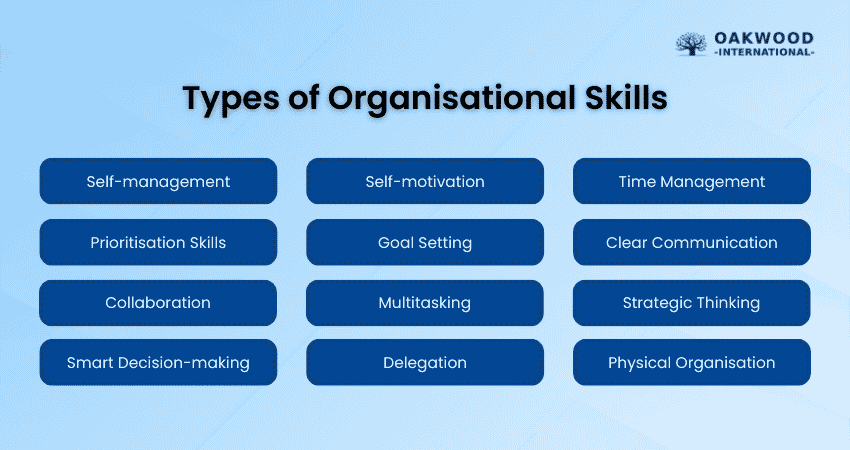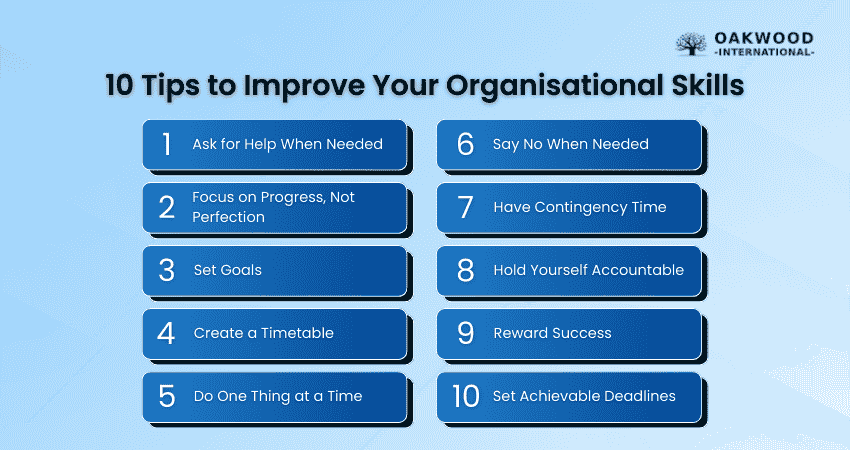Table of Contents


Feel like there are never enough hours in the day to get everything done? Effective Organisational Skills are often the missing link between feeling overwhelmed and staying in control. When you organise your time, tasks, and priorities effectively, your productivity increases and your stress levels drop. In this blog, we will explore the top 12 Organisational Skills that can help you work smarter, stay focused, and achieve consistent success. Let's dive in!
What are Organisational Skills?
Organisational Skills are the ability to plan, manage, and prioritise tasks effectively. They help individuals stay on top of their work, meet deadlines, and keep things in order. Strong Organisational Skills improve efficiency, reduce stress, and allow people to handle multiple responsibilities smoothly.
Being organised means keeping things in order, like planning your day, sorting files, and setting clear goals. For example, an office worker who writes a daily task list, keeps emails tidy and has a clean desk can focus better. This helps them finish work on time without any stress or delays.
Types of Organisational Skills
Good Organisational Skills help manage time, tasks and responsibilities effectively. Here are the most important skills to improve your efficiency and career growth.

1) Self-management
Self-management means handling tasks, responsibilities, and emotions effectively. It helps maintain focus and stay calm under pressure. People who manage themselves well are reliable and productive.
1) Helps maintain work-life balance
2) Reduces stress and improves performance
3) Encourages discipline and responsibility
2) Self-motivation
Being self-motivated means staying focused and committed to work without needing constant supervision. It helps maintain a positive attitude and energy. Motivated individuals complete tasks on time and with better quality.
1) Encourages independence and responsibility
2) Helps stay productive even during challenges
3) Leads to consistent growth and career success
3) Time Management
Using your time accordingly helps finish tasks on time without feeling rushed. It makes sure deadlines are met and avoids the last-minute pressure. Good time management skill keeps your work balanced and easy to handle.
1) Reduces stress by keeping work under control
2) Increases productivity and efficiency
3) Allows better planning and prioritisation of tasks
4) Prioritisation Skills
Prioritising tasks helps focus on the most important work first. It ensures deadlines are met and prevents unnecessary stress. Effective prioritisation improves overall work efficiency.
1) Helps avoid wasting time on unimportant tasks
2) Ensures urgent tasks are completed on time
3) Makes workload easier to manage
5) Goal Setting
Setting clear goals gives direction and motivation to complete tasks. It helps track progress and ensures that you focus on what is most important. With this, all achievable goals lead to steady improvement and success.
1) Keeps work organised with clear objectives
2) Helps measure progress and stay motivated
3) Ensures efficient use of time and resources
6) Clear Communication
It helps to share ideas and instructions in a way that others can understand. This reduces misunderstandings and makes teamwork more effective. Good communicators will also listen well and express themselves confidently.
1) Helps avoid confusion and errors in tasks
2) Builds strong relationships with colleagues and clients
3) Improves teamwork and collaboration

7) Collaboration
Working well with others improves productivity and creates a positive work environment. Good collaboration means sharing ideas, listening, and helping teammates. Teams that work together achieve better results.
1) Strengthens relationships and teamwork
2) Increases efficiency by sharing the workload
3) Encourages learning from others and improving skills
8) Multitasking
Handling multiple tasks at once improves productivity when done correctly. It helps manage different responsibilities without feeling overwhelmed. Good multitasking requires focus and organisation.
1) Saves time by managing tasks efficiently
2) Helps adapt to a fast-paced work environment
3) Increases overall productivity
9) Strategic Thinking
Strategic thinking involves planning ahead and making decisions based on long-term goals. It helps identify opportunities and risks in advance. A strategic thinker finds creative solutions to workplace challenges.
1) Helps make better decisions for long-term success
2) Improves efficiency by reducing unnecessary work
3) Encourages problem-solving and innovation
10) Smart Decision-making
Smart decision-making allows you to assess situations and choose the best course of action. It involves thinking carefully and considering different options before making a choice. Good decision-making helps avoid mistakes and improves work efficiency.
1) Saves time by reducing hesitation and delays
2) Helps solve problems with confidence
3) Leads to better results and workplace success
11) Delegation Skills
Delegating tasks ensures that work is shared effectively among a team. It allows Managers to focus on important tasks while trusting others to complete their responsibilities. Good delegation leads to better teamwork and efficiency.
1) Prevents work overload and reduces stress
2) Increases team involvement and responsibility
3) Improves productivity by dividing work wisely
12) Physical Organisation
Keeping your physical spaces organised helps you find important information easily. A clutter-free workspace improves focus and efficiency. Proper file management ensures important documents are not lost.
1) Saves time by keeping everything easy to find
2) Reduces stress and improves concentration
3) Helps maintain a professional and organised work environment
Learn to identify development needs through the CIPD Level 3 Certificate in People Practice – Join today!
10 Tips to Improve Your Organisational Skills
Improving Organisational Skills helps manage tasks efficiently and reduce stress. Here are some simple tips to stay organised and productive.

Ask for Help When Needed
Seeking help from others saves time and prevents mistakes. Asking questions or getting advice can make tasks easier. Working with a team improves problem-solving and efficiency. Getting support from others also helps reduce stress and makes work feel more manageable.
Focus on Progress, Not Perfection
Focusing on progress instead of perfection keeps work moving forward. Making mistakes is part of learning and improving. Completing tasks on time is better than spending too long trying to make them perfect. Small improvements over time lead to better results than waiting for everything to be perfect.
3) Set Goals
Setting clear goals gives your work direction and purpose. When you set deadlines and clear targets, you create a natural sense of urgency and structure. Goals also allow you to pause, reflect on your progress, and adjust your approach when needed.
4) Create a Timetable
A timetable helps you plan how and when you will complete tasks. By estimating how long each task will take, you can manage and avoid overloading your day. It also gives you a clear plan each morning, which reduces stress and improves focus.
5) Do One Thing at a Time
Multitasking often lowers efficiency and increases mistakes. Focusing on one task at a time improves concentration, accuracy, and the quality of your work. This habit also helps you complete tasks faster and stay mentally organised.
6) Say No When Needed
Taking on too many tasks makes organisation difficult. If your workload is full, it is important to say no and protect your time. This allows you to maintain quality, avoid burnout, and stay in control of your priorities.
7) Have Contingency Time
Unexpected delays are unavoidable in both your personal and professional life. Adding buffer time to your schedule allows you to manage emergencies without disrupting your entire plan. Contingency time keeps your workflow flexible and stress-free.
8) Hold Yourself Accountable
If a task does not go as planned, take responsibility and reflect on its reason. Maybe the task was too large or distractions took over. Learning from these moments helps you build stronger organisational habits over time.
9) Reward Success
Recognising your achievements boosts motivation and confidence. Even small rewards encourage consistency and positive behaviour. Reflecting on what worked well also helps you improve your future planning.
10) Set Achievable Deadlines
Setting realistic deadlines helps complete tasks on time without feeling stressed. Breaking big tasks into smaller steps makes work easier to handle. Meeting deadlines builds confidence and improves time by strictly following schedules. Finishing tasks on time also creates a habit of staying productive and organised.
Learn to implement workforce development plans with CIPD Level 5 Associate Diploma in People Management – Register anytime!
How to Highlight Organisational Skills on Your Resume?
In your resume, every word matters. Even with limited space, it is important to show your top Organisational Skills because many employers actively look for them. Showing that you can plan, manage time, and handle tasks properly can improve your chances of getting securing an interview. Here is how you can highlight it when you know what are Organisational Skills:
1) Select a Clear and Professional Resume Layout
A clean and well-structured resume already shows that you are organised. Use clear headings, proper spacing, and simple formatting. Bullet points make your resume easier to read for both recruiters and computer screening systems.
2) Include Organisational Skills Relevant to the Job Description
Always match your skills with what the employer is asking for. Read the job description carefully and include only the Organisational Skills they want, such as planning, teamwork, or time management. This makes your resume more relevant to the role.
3) Showcase Your Organisational Strengths in the Summary Section
The summary is one of the first sections employers read. Use this space to briefly mention your best Organisational Skills. This could include managing time well, staying organised under pressure, or handling multiple tasks smoothly.
4) Demonstrate Your Organisational Abilities in the Experience Section
Instead of only listing your duties, explain how you used your Organisational Skills at work. For example, mention how you met deadlines, handled many tasks at once, or improved work processes. Keep your points clear and simple.
How to Highlight Your Organisational Skills in an Interview?
Employers often ask about Organisational Skills during interviews. Use simple and honest examples to show how you stay organised. Here is what you can include:
1) Talk About How You Used Your Organisational Skills at a Previous Job
Employers want to hear how you applied your Organisational Skills in real work settings. Therefore, share a real example from your past work. Explain how you planned your tasks, managed your time, or helped a team stay organised. Say what the problem was, what you did, and how it ended well.
2) Talk About How You Used Your Organisational Skills in Your Personal Life
If you do not have much work experience, talk about real-life examples. This could be planning a family event, managing studies alongside part-time work, or handling family responsibilities. Be sure to explain what challenges arose and how you handled them to show problem-solving and planning in action.
Conclusion
Organisational Skills can play a powerful role in both your personal growth and professional success. By learning how to manage your time, tasks, and responsibilities effectively, you can work with more confidence and less avoid stress. Through Upskilling for Success and consistent practice, strong organisational habits can become a long-lasting professional strength.
Gain the skills to succeed in modern workplaces with – Sign up soon!


 Back
Back



 Back to Catagories
Back to Catagories





 + 44 7452 122728
+ 44 7452 122728










